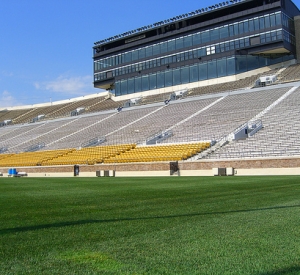2009 Blue-Gold Game Reactions

The 2009 Blue-Gold Game at Notre Dame Stadium threatened to turn into a snooze-fest for the fans and it appeared, for a significant number of those in attendance, that this ended up being the case. As numerous publications and pundits cautioned before the game, it can be futile to infer too much about the status of a team following a spring scrimmage, but surely there must be some meaningful analysis that can occur after a game like this. Contrary to public and press reaction to the game, several valuable insights can be gleaned from the scoring nightmare and unusual play-calling that was evident at Saturday’s spring capstone event.
Offense
To the expectations of those who have waited—patiently or otherwise—for Notre Dame to develop any semblance of an effective ground game, never mind “smash-mouth football,” Charlie pulled out all the stops, giving the ball to Armando Allen, Robert Hughes, or Jonas Gray a total of 53 times. To new coach Tony Alford’s credit, it appears as though his talented corps of running backs have significantly improved their field-vision and have begun playing with more grit and determination to ferret-out running lanes and grab an extra one or two yards at the end of the play. In short, there genuinely is a lot to be pleased about regarding the technique and behavior of the running backs yesterday. However, there are still a few lumps in the proverbial gravy.
Firstly, there is some merit to the idea that what Weis wanted fans, press, and future opponents alike to take away from the Blue-Gold game was a renewed potency and change of character from last year’s anemic Irish ground game, regardless of whether the rushing attack has actually made a significant leap in production. And secondly, it was readily apparent that the defense was tiring rapidly in the second half and that this resulted in much of the running game’s overall success that occurred late in the game—as testified to by Armando Allen’s offensive MVP honors despite having the worst overall rushing statistics on the day (MVP ballots from media were due with a full ten minutes left in the game).
Conversely, while reactions to the passing game’s impotency cite the unusual format and purpose of Saturday’s scrimmage as the primary cause, there is little reason that plausible game-like conditions, contrived or not, should result in such a poor showing from the vaunted Irish passing attack. An alternate possibility is that Clausen and Crist were hamstrung by imbalanced play-calling and by the general unavailability of their top-flight receivers—Tate split time between the game and Frank Eck Stadium, Floyd had only one catch, and Allen was used sparingly as an option in the passing game.
Defense
One of the bright spots for this year’s team appears to be the pronounced mobility and aggression of the young defensive line. Ethan Johnson had a huge game, recording six tackles including a two-handed sack and the line as a unit recorded three sacks with numerous hurries. This positive however, must be weighed against the relative inability of the Irish front four to stop the run—Zeke Motta and his linebacking brethren were a busy bunch—and the apparent relative success of the offensive line’s zone-stretch scheme in opening holes for Hughes and company. It is crucial that this year’s line be able to record the occasional sack and pressure relentlessly without over-pursuing and allowing opposing backs to enter the secondary.
The secondary also ended up notching a productive performance with their stifling coverage of the Irish receivers. Robert Blanton returned a Clausen interception for a touchdown, Harrison Smith registered six tackles (two for a loss), and also of note was Darrin Walls’ six-tackle performance—he’s a welcome option returning at cornerback. All in all, the defense did a remarkable job of showing off it’s new quickness up front and experience in the secondary. I’m looking forward to seeing this unit hit the field in the fall.
Special Teams
Beyond Armando Allen’s nice return of 29 yards and one average Golden Tate effort, there weren’t many punts and absolutely zero kickoffs to give fans an idea as to whether the relatively non-explosive return unit expects to rectify the situation in 2009. The jury also continued it’s deliberations in regards to the kicking game—Brandon Walker was able to convert a 48-yard field goal that had just enough leg on it to clear the crossbar, but he also badly shanked one of a handful of otherwise solid PATs off the left upright. It appeared as though the game was a microcosm of last year’s inconsistently average special teams. Hopefully progress has been made which wasn’t evident in the Blue-Gold showing.
Summary
Without overextending to draw strained conclusions from the 80th annual spring contest, it is readily apparent that the Irish are making steady progress in their goal to rectify the most glaring weaknesses in last year’s personnel and coaching. It is also equally obvious that they have much more ground to cover before the fall opener against Nevada if they hope to enter the BCS picture this season. Weis’ own words from the press conference following the game are as accurate as anyone can muster:
“I think we’ve improved in a lot of areas, but we have a long way to go to be a real good football team. At least potentially you could see the elements are in place to be a real good football team, but we have a lot of work to do.”

